Nairo Quintana revives Colombians' passion for cycling
- Published
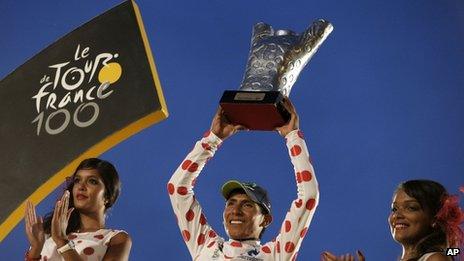
As she waits for the arrival of cycling hero Nairo Quintana to his hometown of Tunja, Loralba Piragauta uses Colombia's rich cycling tradition to try to explain the excitement and sense of anticipation gripping the usually tranquil capital of the province of Boyaca.
"Imagine, I was a little girl, but I still remember the victories of Martin Emilio 'Cochise' Rodriguez and how proud we felt," she says of the man who first put Colombia on the international cycling map by breaking the world hour record in 1970 and winning two stages of the Giro d'Italia in 1973.
"And thanks to Nairo we're experiencing that same thrill again. I'm sure he's making young kids feel the way we felt back then, and also showing them what can be achieved with hard work," she adds.
We are in Tunja's main square, where a giant screen has been replaying Quintana's victory in stage 20 of this year's Tour de France, which secured him the title of King of the Mountain, Best Young Rider and second place in the overall classification.
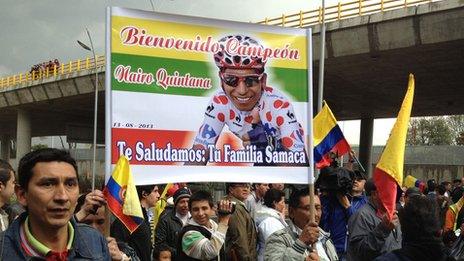
Nairo Quintana was given a hero's welcome upon his return to Colombia
"Colombia's greatest cycling result ever," an emotional local radio commentator tells the crowd that has gathered for the young rider's homecoming ceremony.
And after witnessing the reception given to Quintana the day before in Bogota - hundreds of screaming fans at the airport, an open top bus parade through the streets of the capital, and a meeting with the president to receive the highest honour in the land, the Cross of Boyaca - I am inclined to believe him, even though I am aware it is a bold claim.
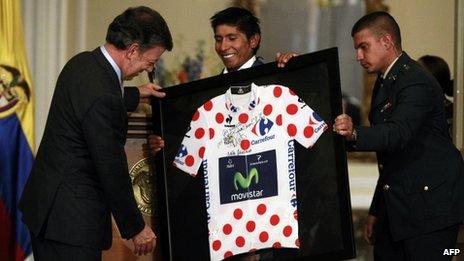
Nairo Quintana was received in the presidential palace by Juan Manuel Santos
Indeed, Colombia is a proud cycling country and past glories include Luis Herrera's victory at the Spanish Vuelta in 1987, Santiago Botero's Time Trial World Championship in 2002 and Rigoberto Uran's silver medal in the London 2012 Olympics.
But the Tour de France is by far the most prestigious race in road cycling.
And Nairo Quintana is only 23 years old and a local boy to boot, which also explains the unbridled enthusiasm here in Boyaca.
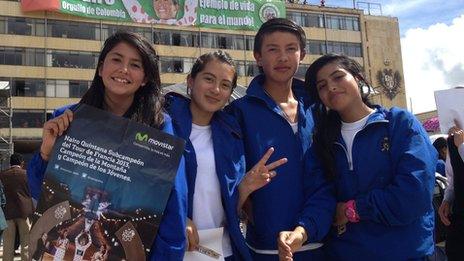
Nairo Quintana's victory has inspired young Colombians to take up cycling
"He's a phenomenon, all the youth now want to be like Nairo," says Sigifredo Pina, the president of the municipal council of Combita, the town where the rider grew up and the next stop of his homecoming tour.
Role model
"He's my hero, his victories give me strength," says Marco Aurelio Ausaque, from the neighbouring municipality of Soraca, who also dreams of becoming a professional cyclist.
For Marco Aurelio, and others like him, riding on the same hilly roads where the runner-up of the last Tour de France first started to cycle is inspiring.
Tunja and Combita sit at more than 2,800m above sea level, and the steep roads that wind up and down the eastern range of the Colombian Andes have made Boyaca a hotbed of world class cyclists.
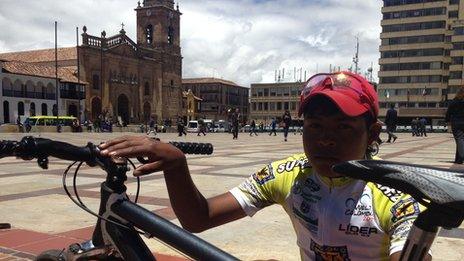
Marco Aurelio Ausaque wants to follow in Nairo Quintana's footsteps
Before Nairo Quintana there was Fabio Parra - who finished third in the Tour de France in 1988 - and, more recently, Mauricio Soler - best climber in 2008 and Quintana's personal hero.
But every generation needs its own role models. And Quintana is certainly doing all he can to ensure that Boyaca's long and distinguished cycling tradition carries on.
"In 30 years' time I don't want people talking about the big welcoming party they once organised for me. I want them talking about the big welcoming they have to organise for a new local boy," a visibly moved Nairo Quintana tells the crowd in Tunja.
"That's why I want a commitment from the local authorities, in front of all this people, that they will do everything they can to support cycling and sports," he says, to one of the biggest cheers of the afternoon.
National pride
It is not only the people of Boyaca, who are beaming with pride over Quintana's success, nor are youngsters the only ones inspired by his example.
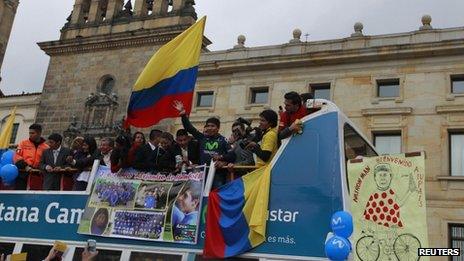
The enthusiasm for Quintana's win was no less great in Bogota
"He has rekindled Colombia's passion for cycling. He gives all of us cyclists strength," 63-year-old Marco Antonio Lopez told the BBC while waiting for Quintana at Bogota airport.
"Imagine, with my age I rode my bike all the way from Armenia [some 280km away] to be here."
"We all ride bikes and we truly admire him," said Carolina Cruz, a mother-of-two from Cali who was also at the airport with her family, hoping to catch a glimpse of Quintana.
"The fact is that cycling is our true national sport, more so than football."
And that might explain why cycling heroes in Colombia receive a treatment most countries seem to reserve for famous footballers and rock stars.
- Published4 May 2013
- Published20 July 2013